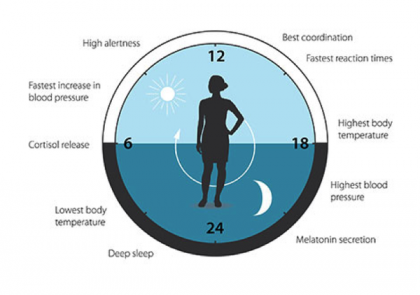- Home
- Editorial
- News
- Practice Guidelines
- Anesthesiology Guidelines
- Cancer Guidelines
- Cardiac Sciences Guidelines
- Critical Care Guidelines
- Dentistry Guidelines
- Dermatology Guidelines
- Diabetes and Endo Guidelines
- Diagnostics Guidelines
- ENT Guidelines
- Featured Practice Guidelines
- Gastroenterology Guidelines
- Geriatrics Guidelines
- Medicine Guidelines
- Nephrology Guidelines
- Neurosciences Guidelines
- Obs and Gynae Guidelines
- Ophthalmology Guidelines
- Orthopaedics Guidelines
- Paediatrics Guidelines
- Psychiatry Guidelines
- Pulmonology Guidelines
- Radiology Guidelines
- Surgery Guidelines
- Urology Guidelines
How biological clock actually works-Research worth a Nobel Prize

The Nobel Prize in physiology or medicine was awarded to three Americans Jeffrey C. Hall, Michael Rosbash and Michael Young who helped elucidate the rhythm of life, pinpointing some of the biological mechanisms that keep our internal body clocks ticking away. By studying the genetics of fruit flies, the three managed to isolate a gene, called period, involved in setting the body’s natural daily rhythm; Hall and Rosbash then showed that protein (“PER”) encoded by that gene works a bit like sand in an hourglass as it accumulates at night in cells and then breaks down and dissipates during the day, oscillating “over a 24-hour cycle, in synchrony with the circadian rhythm,”. Young then went on to discover two more genes, called timeless and doubletime, that also appear to keep the body’s 24-hour-a-day hormonal, blood pressure, and temperature rhythms in a healthy meter, as they orchestrate a dance of feedback loops, protein checks, and delicate adjustments.
The body responds primarily to light and darkness and is found in all living things — plants, animals (including microbes) and human beings.Although biological clock is used interchangeably with circadian rhythms but they are not one and the same. Biological clocks are an organism’s innate timing device and they produce circadian rhythms and regulate their timing.Like a switch, light can turn off and turn on genes that control the molecular structure of biological clocks. Changing the light-dark cycles affects the sleep-wake cycle by speeding up, slowing down, or resetting biological clocks as well as circadian rhythm.The biological clock is generated by about 20,000 neurons that form a structure called the suprachiasmatic nucleus (SCN), which is found in the hypothalamus in the brain. These neurons receive signals from the eyes. Besides, light, exercise, hormones, and medications affect the SCN and the setting of the circadian clock
Life on Earth is adapted to the rotation of our planet. For many years we have known that living organisms, including humans, have an internal, biological clock that helps them anticipate and adapt to the regular rhythm of the day. But how does this clock actually work? Jeffrey C. Hall, Michael Rosbash and Michael W. Young were able to peek inside our biological clock and elucidate its inner workings. Their discoveries explain how plants, animals and humans adapt their biological rhythm so that it is synchronized with the Earth's revolutions.
Using fruit flies as a model organism, this year's Nobel laureates isolated a gene that controls the normal daily biological rhythm. They showed that this gene encodes a protein that accumulates in the cell during the night, and is then degraded during the day. Subsequently, they identified additional protein components of this machinery, exposing the mechanism governing the self-sustaining clockwork inside the cell. We now recognize that biological clocks function by the same principles in cells of other multicellular organisms, including humans.

The circadian clock anticipates and adapts our physiology to the different phases of the day. Our biological clock helps to regulate sleep patterns, feeding behavior, hormone release, blood pressure, and body temperature.
The biological clock is involved in many aspects of our complex physiology. We now know that all multicellular organisms, including humans, utilize a similar mechanism to control circadian rhythms. A large proportion of our genes are regulated by the biological clock and, consequently, a carefully calibrated circadian rhythm adapts our physiology to the different phases of the day as depicted in picture above. Since the seminal discoveries by the three laureates, circadian biology has developed into a vast and highly dynamic research field, with implications for our health and well being. The circadian clock anticipates and adapts our physiology to the different phases of the day. Our biological clock helps to regulate sleep patterns, feeding behavior, hormone release, blood pressure, and body temperature.
Circadian rhythm works best when there is regular sleep habit such as going to bed at night and waking up in the morning around the same time on all days, weekends included. Jet lag, daylight savings time, or staying awake can disrupt the circadian rhythm. Researchers are studying how shift work as well as exposure to light from mobile devices during the night may alter circadian rhythms and sleep-wake cycles.
Irregular rhythms have been linked to various chronic health conditions, such as sleep disorders, obesity, diabetes, depression, bipolar disorder, and seasonal affective disorder.

Disclaimer: This site is primarily intended for healthcare professionals. Any content/information on this website does not replace the advice of medical and/or health professionals and should not be construed as medical/diagnostic advice/endorsement or prescription. Use of this site is subject to our terms of use, privacy policy, advertisement policy. © 2020 Minerva Medical Treatment Pvt Ltd